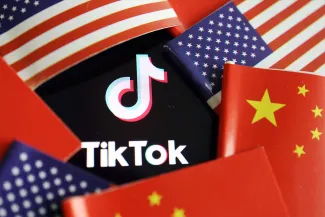Should the United States Ban TikTok to Preserve National Security?

Overview
U.S. politicians have raised alarm that TikTok, a popular video-sharing social media app owned by the Chinese company, threatens U.S. national security. Should the United States impose a ban on TikTok to safeguard citizens’ data and the country’s security?
Students will learn about the ways that private businesses can intersect with national security and the opportunities and limitations for government regulation of digital technologies.
The Situation
U.S. politicians have raised alarm that TikTok, the popular video-sharing social media app owned by the Chinese company ByteDance, threatens U.S. national security. Critics in the United States have suggested the app is vulnerable to adversaries in the Chinese government who could use data to undermine the security and privacy of individuals and the United States.
The app has more than one billion users worldwide. That includes 150 million monthly active users in the United States. Like many social media apps, it helps connect people across the globe. Businesses also leverage the app for marketing and other commercial purposes. TikTok’s core demographic is young people between the ages of fifteen and twenty-four.
Critics have called for the U.S. government to ban TikTok to bolster national security. They warn that the Chinese government, which hosts a broad law that allows it to access information from private companies, can misuse the app and leverage users’ data. The United States has remained relatively open to online businesses, although a ban would not be entirely new. The Trump administration banned several other Chinese software apps, such as Alipay and WeChat Pay, in 2021. China, for its part, has maintained firmer control on cyberspace, banning many popular U.S. apps including Google.
TikTok could be particularly insecure because users interact rapidly with a great deal of content, and personal information about them can be quickly gleaned from the app. A former White House official has warned that bad actors could easily manipulate the app’s suggested “For You” content. They fear such interference could ultimately influence U.S. public opinion, in turn allowing the Chinese government to influence U.S. elections.
Still, proponents urge that despite those risks, internet freedom is a core U.S. value. To them, banning apps can serve as a slippery slope to denying individual freedoms and businesses rights. Some have argued that banning TikTok could “dangerously expand the national security state." They argue that preserving online freedom and international businesses’ ability to operate within the United States should be a top priority.
The TikTok debate touches on wider questions about effectively balancing online safety and freedom. Although countries have called for a new UN treaty to counter cybercrime, so far they have not settled on a multilateral agreement to govern online space. How to balance those protections while preserving internet rights and freedoms is also still debated.
Decision Point
Pressure is mounting among U.S. legislators to secure U.S. national security against the vulnerabilities of the popular TikTok app. Some have called for banning the Chinese-owned app completely. In response, TikTok’s leadership has tried to assure U.S. lawmakers that its app is secure. Out of a strong desire to avoid a U.S. ban, TikTok recently established new safeguards such as creating a new subsidiary “TikTok U.S. Data Security” which aims to better protect U.S. data.
The U.S. president is seeking talking points for an upcoming speech on the issue. The National Security Council (NSC) needs to advise the president on the best course of action in the face of rising national attention to the TikTok question.
NSC members should consider the following policy options:
- Pressure ByteDance to sell the TikTok app to an owner outside of China. Selling the app to a different country could provide a way for TikTok to operate more safely within the United States. However, that strategy could fail if ByteDance does not comply.
- Threaten Tiktok with a U.S. ban. Exert pressure on TikTok to choose between significantly changing its governance and implementing stronger data safeguards or facing a ban on operating in the United States. That effort could help preserve internet freedoms while better protecting users. However, China’s government will not necessarily agree to any reforms or effectively enforce them.
- Prioritize business and internet freedom by working only on multilateral approaches to bolstering cybersecurity. Such approaches could include increased U.S. leadership in developing stronger international laws to govern international cyberspace. This option could help build a stronger systematic approach and global buy-in. It will, however, face Chinese pushback and inevitable barriers to enforcement.
Additional Resources
- Don’t Ban TikTok. Fix Internet Privacy New York Times (gift link)
- Advancing Cyber Diplomacy Symposium Council on Foreign Relations
- America May Be a Step Closer to Banning TikTok The Economist
Need inspiration for how to structure your Mini Simulation?
More Mini Simulations


